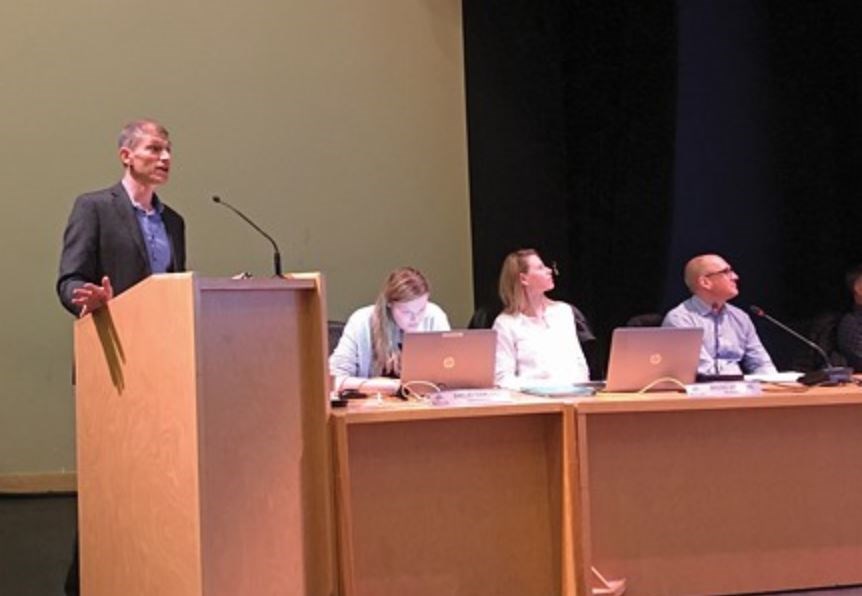Much has been made of the provincial government's new "speculation tax" and Whistler's exemption from it, but it's still not clear what effects the tax will have in Whistler or elsewhere in the province.
"Whistler is outside the zone; what happens here? That's an interesting question, and a tough one," said UBC professor Tom Davidoff, in a presentation to Whistler's Committee of the Whole on April 10.
Davidoff played a large part in developing the policy, which was built off a policy proposal he wrote with several UBC colleagues called the BC Housing Affordability Fund (BCHAF).
One effect in Whistler could be buyers coming from now-taxed districts, Davidoff said.
"On the other hand, a lot of the non-Whistler owners are B.C. residents, and (there's also) the fact that this is going to depress prices in B.C, elsewhere, which will presumably reduce demand and reduce prices here in Whistler as well, so I think there's offsetting effects," he said.
The impact in communities outside of Whistler remains vague as well.
Davidoff said taxed owners essentially have four options: Sell the property, pay the tax, or .
In writing the BCHAF, the authors always assumed Whistler would be exempt.
"We assumed that the dependence on tourism was so great that you wouldn't want to risk alienating the vacationers," Davidoff said.
The proposal aimed to restructure B.C.'s tax burden from those working for a living to those who own property (exempting certain categories like pensioners and locals), while shifting the new tax revenue directly to locals.
The question comes down to where to place taxes so they won't hurt the economy, whether that's on incomes, sales or property.
"Property is pretty attractive," Davidoff said. "If you have a line out the door at a pizzeria, your price is too low. If you have a line out the door at the building permit office, raising property taxes a little bit, all it's going to do is eat into the line."
As it stands now, B.C.'s tax code sends the wrong message, Davidoff said.
"Our tax code in Â鶹´«Ã½Ó³»says, 'Hey world, come buy real estate here, we're going to charge you a very low tax rate, but God forbid you try to work for a living, or sell anything, then we're going to nail you,'" he said. "And so what have we got? We have the worst affordability almost anywhere in the world, right? Like, working is really bad, and property values are really high, so good work," he added, feigning applause.
To Davidoff, it makes sense to shift the tax burden to property owners.
"I thought it would be a politically achievable step in the direction of tax sanity, but ours was budget neutral," Davidoff said of the BCHAF (the provincial government's new tax will go to general revenue).
"If you trust the government, general revenue is just as good as giving the money back to taxpayers, because the government is using the money optimally."
Davidoff suggested Whistler raise property taxes 10 per cent, while allowing permanent locals and renters to claim a remittance check for the revenue.
"You make life easier for people who live and work here, you raise the cost of ownership for people who own property that don't live here full time," Davidoff said.
"It wouldn't be great for property values, of course, but it would provide a demand-side cooling that the affordability fund is not providing, and it would provide, of course, cash for people who are strapped locally, or you could use the money to build some extra rental units."
Mayor Nancy Wilhelm-Morden pointed out that plan would likely end in the turfing of mayor and council, as second homeowners are eligible to vote if they are Canadian.
Councillor Cathy Jewett noted that Whistler has a lot of empty homes and scores of jobs to fill, and wondered how the tax could be adjusted to address that problem.
"There has to be incentive for people to not, for instance, turn the suite into a billiards room or a wine cellar, because these people have deep, deep pockets," Jewett said. "How can we appeal to them? Obviously money doesn't seem to be the way."
The answer could be a tax on empty homes, Davidoff said.
"The beauty of the empty homes tax is you get money if they don't change their behaviour, and that money can go towards a rental allowance for workers or direct construction of property ... You either get money or you get extra rental units," Davidoff said.
"But you're going to have to do something on the supply side. This is not going to be enough—even with some kind of tax reform, I don't think it would be enough. I think you have to address supply as well."
The way the province has structured its new tax, B.C. owners get exemptions and credits toward second homes, while out-of-province Canadians pay a one-per-cent rate and foreign owners and satellite families pay a two-per-cent rate.
"Importantly with this tax, nobody has to pay, because if you're an owner and you're not using the home as a primary residence ... you can rent the place out for six months a year and you're off the hook, or rent it out the whole time, you're off the hook," Davidoff said.
"You can sell and stay in a hotel when you want to come and visit, or you can move in permanently, so you know, nobody has a gun to their head, depending how you feel about it."
But in terms of the long-term impact of the tax?
"I don't know," Davidoff said. "I don't think anybody knows."



